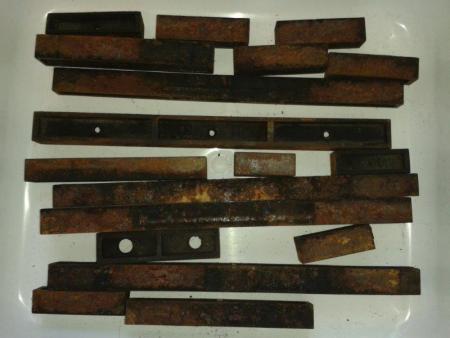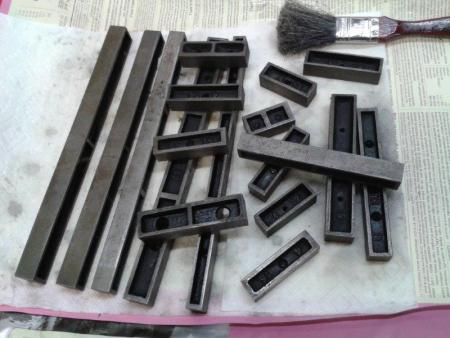Rust removal
A while back I suggested using vinegar and lemon juice (approximately half and half) to remove rust, but no one seemed interested. I recently used this on some cast iron furniture which was pretty bad, and thought I would show you before and after pictures of how effective it is. (There was ink as well as rust so I also did some scraping with a razor blade and rubbing with steel wool during the process, but it turned out well).
I immerse the objects to be cleaned in the solution, stir occasionally and turn the pieces and keep them separated while waiting a few hours, then rub the loose rust off with steel wool. I do that about 3 times. At the end I rinse and dry the pieces as fast as possible (so they don’t start rusting again), and then lightly coat them with oil so they won’t rust in the longer term. I used motor oil diluted with kerosene for the oil, but I think you could use baby oil as a less toxic alternative.
Another advantage is that vinegar and lemon juice are about as safe as you can get in the way of de-rusting chemicals, other than they are acid and you should use normal precautions like goggles and gloves. Baby oil is also, of course, a pretty safe oil to use.

rustedlowres.jpg

restoredlowres.jpg
Nice! I’ve been using just vinegar to soak and clean a pile of rusty galley trays. Good tip about adding lemon.
It takes a while, doing it in iterations (soak/scrub/repeat), but the results are worth it.
-Dee
I use vinegar plus salt, which would be cheaper than store-bought lemons, but if you’ve got a lemon tree… .
If your looking for a more serious process what follows is something I’ve done for years now and it works very very well!!! One of the common steps in the process with vinegar/lemon juice and this process is “soak”…let it do the work and walk away for a bit. These process are not instant rust removal like sand blasting. So the link below outlines the process. I use Washing Soda instead of Baking Soda, I find it works better. I also have a larger tank, and run 15-20Amps (DC) thru my system.
http://www.wwgoa.com/article/removing-rust-with-electrolysis/
This process was used to free this press up….it currently is all apart and in primer awaiting painting. The main shaft on the platen/bed was rusted very hard together and I “cooked” it for well over 30hrs….but it finally came apart. Many times what is so tight you can’t make move with a hammer comes apart with just your hands after this process!!!! Same as the other process explained before, once we remove and clean the item you need to be getting the part coated in a light oil to stop surface rust!!! When your done with this bucket of solution you can just dump it out on the driveway and then when dry swipe away the rust/dirt. I haven’t dumped mine for over 10 years….just keep adding water when I fire it back up.
http://www.libertypressia.com/PressRoom/alertpress.html
Steve Alt
DeeElling, it seems to work better for me if I use vinegar PLUS lemon juice. It would be interesting to know why, from a chemical point of view. I wonder if we have any chemists on BP who could weigh in on this?
parallel_imp, I use bottled lemon juice; it isn’t too expensive. It is interesting that salt can be used instead. Salt seems counterintuitive, since road salt rusts cars, but I’m sure it does work if you have used it with success.
Steve, I used the electrolysis method once, with washing soda, to de-rust a Pearl #3 flywheel. As you say, it works well. Since I’m not lucky enough to have a dedicated tank like you have, I use vinegar/lemon juice for little jobs like the cast iron furniture above.
Thanks for the input, all.
I’ll add my praise of the electrolysis method. In addition to requiring the least amount of physical work, it’s also science in action!
I’ve used this method to clean all sorts of things, including a tray of composing sticks and countless galleys.
Mike
When I read about the vinegar-salt method, it was described as a dilute hydrochloric acid. I had 200 12x18 galleys with surface rust, and a 4-hour bath was enough, but overnight was not too much.
Next time I’ll try the electrolysis; got a trickle battery charger that should work.
Just buy one of these:
https://www.youtube.com/watch?v=CLaBFkeHG0A
Looks expensive…..
http://cleanlaser.de/wEnglish/produkte/high-power-cl-1000.php
Evapo-rust , check it out on the net. AutoZone sells it $22 a gallon. No scraping, steel wool! Just soak it for an hour or so and wipe off. I’ve used it on galleys, composing sticks. Works great!!!
Here’s my potted account of a method that works well for me, and has a following. It’s faster than vinegar.
CITRIC ACID FOR RUST REMOVAL (with notes on other methods)
Among tool aficionados, citric acid seems to be the favorite home chemical for rust-removal. Vinegar has its enthusiasts too; they are content with much longer soak times, on the order of 24 hrs, and are willing to put up with the odor. Some use good old naval jelly, a form of phosphoric acid. Evapo-Rust also has a good reputation.
The citric acid I used is a fairly fine, crystalline, white powder. I bought it in bulk. It’s cheap. No other ingredients were listed on the label, so I assume it’s pure citric acid. It is available in health-food type stores, and is used for canning. It may come in jars, from the makers of, e.g., dietary supplements, or may come in bulk.
You just mix it with water. Proportions vary. The stronger, the faster it will act, and the more frequently you will have to check it to avoid etching. It’s safe, given commonsense precautions like keeping it out of your eyes, and perhaps using rubber gloves with the stronger solutions. This is true even in the 1:10 mixture that woodworking maven Christopher Schwarz uses to remove zinc plating. With the weaker solution that I’ve used, I’ve dunked my bare hands in it often, with no ill effects. (Also, of course, if you spill it on anything you don’t mean to have it act on, clean it up promptly.)
Here’s what I’ve used with good results:
2 tablespoons of powdered citric acid (I may try 4 tablespoons next time—others have used this much—and more).
1 quart of warm water.
Mix well in a glass bowl or baking dish. The citric acid dissolves readily.
As for containers for the chemical bath, the material doesn’t seem to be critical. You’re not limited to glass. People use various plastic containers. Next time I soak something large, I’m going to try one of the cheap, disposable metal baking pans from the supermarket. For soaking long items, people have used lengths of PVC pipe, with a PVC endcap. For tools with handles that couldn’t be soaked (lest the finish be damaged), I’ve used a beer bottle or a wider-mouthed condiment bottle to hold the handle above the solution.
Place metal piece in liquid. Leave it for two hours. I stir it occasionally to keep the piece exposed to fresh liquid. I usually take the piece out after an hour and it a light going-over with a brass brush, and the replace it. I may do this several times. You want to check on progress every half-hour or so in any case. (Every hour may be fine for a weaker solution.) After two hours, the metal may start to etch, so you don’t want to leave it in longer than necessary to get the degree of rust removal needed. Two hours will probably be plenty for most jobs, but I’ve gone 3 hours or more for very heavily rusted pieces, especially where I was more concerned with getting the rust off than with avoiding a little etching.
It doesn’t hurt if the pieces being soaked are in contact with one another. (I had been worried about some sort of electrical effect.)
Nothing much will happen at first, and even after an hour, though the pieces looked somewhat cleaner, one might still doubt. With the 2 tablespoon/quart solution, I could see tiny bubbles forming, and little clouds of tinier bubbles (or solids?) drifting up from the metal.
After two hours, however, the pieces are usually clean. Another light going-over with a brass brush removes any remaining black stains in the formerly rusted areas.
Like most rust-removal methods, this will leave greyish patina on the metal. It can be polished off. Scotchbrite is good for this, and for a general final cleaning.
When done, I rinse the pieces in water, dry them with paper towels, canned air, and a hair dryer (or an oven), and then oil them
I don’t change the liquid for each successive batch, I just re-use the same liquid. The liquid gradually turns a clear golden yellow, looking disturbingly like the white wine I was drinking when I first tried it. There will be a slight smell, reminiscent of a junkyard in the rain.
In one case, the solution kept working, on a succession of metal pieces, until I stopped after six hours. I then saved some and used it for a couple hours the next day.
OTHER METHODS
Better-equipped and more knowledgable cognoscenti often use a homemade electrolysis setup (sounds pretty simple), though some may also use a citric acid bath to remove the deepest rust. On the other hand, electrolysis is used successfully on seized-up machinery.
I’ve also used Barkeeper’s Friend Cooktop Cleaner. I find it’s no substitute for a citric-acid bath, but it’s good for spot applications on light rust. It also shines up brass nicely. It will take the finish off wood. It’s only a thin paste, rather runny, so it may be difficult or impossible to get an even coat that will give even results over more than a small area. It also removes mineral deposits from metal and porcelain kitchen and bathroom fixtures. (It’s what keeps my kitchen from being condemned.)
Ken, thanks for your comments. You mention black stains in the formerly rusted areas. I got black stuff when I used electrolysis as well. I think what happens is, that the process converts brown rust (ferrous oxide, Fe2O3), to ferric oxide (Fe3O4) which is black. The ferric oxide is very easy to remove with a little light brushing, or rubbing with steel wool.
Regarding citric acid, a light bulb went on in my head when you talked about it. That must be why lemon juice works for me. Since it comes from a citrus fruit, I’m sure there is a lot of citric acid in it. Now I just have to figure out which is cheaper to use, powdered citric acid or lemon juice.
Geoff
Geoffrey, that’s very interesting about the chemistry, and the black stuff being ferric oxide, and easy to remove. It gives me a bit more understanding of what goes on.
I’d guess the citric acid is a lot cheaper than lemon juice, and probably cleaner, since there’s no organic matter. I don’t remember what I paid for it, just that enough to fill a 16-oz jar was cheap—too cheap to make an impression. At 2 tbsp/qt, that much will go a fairly long way, unless you’re cleaning something big.
I mentioned that it didn’t matter that the metal pieces in the bath touched each other. I have no idea if that’s true with electrolysis. For all I know, something spectacular and undesirable would happen if there were an electric current.
Happy de-rusting!